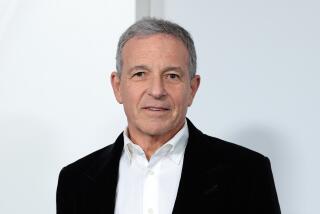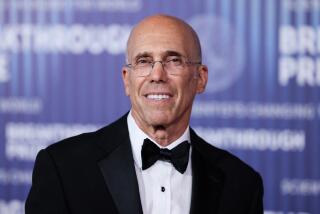Testimony Turns Bitter as Eisner Takes Stand
- Share via
Former studio chief Jeffrey Katzenberg’s breach-of-contract lawsuit against Walt Disney Co. took an explosive, bitter turn Tuesday as Chairman Michael Eisner acknowledged in testimony that he may have once said of Katzenberg, “I hate the little midget,” and that he thought a Katzenberg contract demand was “greedy.”
The disclosure of Eisner’s disparaging remarks about Katzenberg was an extraordinary turn in the trial, which Katzenberg’s side argues has its foundation in Eisner’s “personal animus” toward Katzenberg.
Tuesday’s testimony in a Century City law office proved the most volatile yet in what has turned into a bitter public scrap, all the more extraordinary given that it involves two of the most powerful figures in Hollywood and, in Eisner, one of the top corporate executives in America.
Katzenberg is seeking at least $250 million in a bonus he says Disney was obligated to pay him when he left the company in 1994. Disney is arguing that Katzenberg, now a principal in DreamWorks SKG, forfeited the bonus when he opted to leave that year, two years before his contract expired.
The volatile testimony came as Katzenberg attorney Bert Fields confronted Eisner with notes taken by Tony Schwartz, co-author of Eisner’s autobiography, “Work in Progress,” published last year.
Fields asked Eisner if he hates Katzenberg, then cited remarks in the notes indicating such feelings. That triggered an angry reaction from Eisner, who said he may have made such remarks offhand and in jest. He said he didn’t put them in his book and never intended to have such statements come out publicly.
“I think you’re getting into an area that I will say is ill-advised,” Eisner said, adding that Fields was “going down a direction that’s not in your client’s best interest.”
Eisner added: “I didn’t hate Mr. Katzenberg. I still don’t hate Mr. Katzenberg.”
But the introduction of Schwartz’s notes proved an embarrassment for Eisner. Earlier, under questioning from Fields, Eisner said he didn’t know whether he or Disney had paid Schwartz for his work in writing Eisner’s book.
At one point, Fields cited notes quoting Eisner as saying of Katzenberg: “Jeffrey was my retriever. He was [the] end of my pompom. I’m the cheerleader.”
After a brief recess, Eisner, under questioning from Disney lawyer Lou Meisinger, said he was especially mad at Katzenberg when he was talking to Schwartz because he had inadvertently received a fax sent by Katzenberg to Fields that thanked the lawyer for cooperating with a magazine article on the saga surrounding Katzenberg’s departure.
That, Eisner testified, revealed a “dark side” of Katzenberg and affirmed his suspicions that Katzenberg was “negotiating with me through the press” and was leaking sensitive information about the company.
“I just got really annoyed. It just confirmed to us a fact I knew existed,” Eisner said.
Eisner said that after receiving the fax, his attitude was “screw that” and that he would refuse to pay Katzenberg any bonus “if he’s going to play this media game, this deceptive game, this disingenuous game.”
The two sides reached a partial settlement in 1997 in which Katzenberg received what amounts to an advance against what he eventually will receive, an amount to be determined by a retired judge acting as a referee in this current trial phase.
On Tuesday, the Hollywood Reporter, citing unnamed sources, said Katzenberg received $77 million from Disney in the partial settlement. Neither side would comment, but several sources familiar with the case suggested that the amount was low and that more than one payment was involved. Sources put the amount higher, possibly in the $100-million range.
Eisner took the stand in the morning in a tense courtroom setting, wearing a stern look on his face and showing little of the gregarious style he often displays publicly. He sought to portray Katzenberg as overly demanding and greedy, testifying that he even agreed to pay Katzenberg an extra $400,000 bonus on top of a $7.1-million bonus he received after he left Disney in a bitter falling out.
Under questioning from Meisinger, Eisner, seeking to question Katzenberg’s accomplishments in the 10 years he ran Disney’s film and TV unit, said Katzenberg was opposed to reviving the studio’s animation franchise and also releasing its classic animated films on video.
Katzenberg, who has acknowledged early doubts about animation, eventually oversaw such hugely profitable animated films as “The Lion King” and “Aladdin,” as well as the lucrative release of such classics as “101 Dalmatians” and “Snow White and the Seven Dwarfs.”


